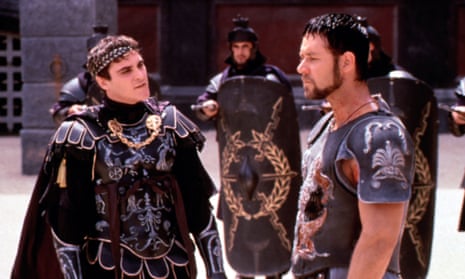“Joey, do you like movies about gladiators?” the creepy pilot asks the small boy in Airplane!. To younger audiences, the joke no longer makes any sense. In Airplane!’s day, sword-and-sandals movies had become an outdated, unwittingly homoerotic joke. But then came Gladiator, and the joke was on us. Released 20 years ago this month, Ridley Scott’s Roman epic gave the old cliches a new lease of life. It was all here: Colosseum action! Rippling man-flesh! Tigers! But Gladiator had its cheesecake and ate it. It served up crowd-pleasing spectacle and airline-ad visuals but also solemn, Oscar-worthy drama (and, in retrospect, a fair degree of camp).
Gladiator was one of the first movies to make use of CGI technology to recreate actual history, rather than aliens and monsters. Its ancient Rome, packed with virtual crowds, looks like a video game at times, but back in 2000 it was groundbreaking. Others took note. Within a few years we had a mini sword-and-sandals revival: Troy, Alexander, King Arthur. By Zack Snyder’s overblown 300, the genre had devolved back into parody, but it has never really gone away: Joaquin Phoenix’s incestuous despot in Gladiator has a very Game of Thrones vibe to him, for example. Ridley Scott tried to repeat the original formula himself, first with the post-9/11 Crusades drama Kingdom of Heaven, which only proved that Orlando Bloom was no Russell Crowe, then with 2010’s Robin Hood, which proved that Russell Crowe wasn’t exactly his former self, either.
Gladiator was the pinnacle of Crowe’s career (he won the best actor Oscar) but also the beginning of his transition from commanding Hollywood lead to grumpy, difficult diva. The way Crowe tells it, he “rescued” Gladiator, giving it his all on-screen and whipping the awful script into shape off it. You get the impression Crowe has thought of himself as the boss ever since, hence the stories of bad behaviour, the irritable press interviews, the abortive second career as a rock star. He has mellowed somewhat recently, using his menace to good effect in True History of the Kelly Gang, and as Roger Ailes in The Loudest Voice, but the steady ascent of Joaquin Phoenix’s career is a study in contrasts – and, perhaps, ego management. Phoenix tends to disappear into his characters; Crowe’s real-life persona often overshadows his.
Now Gladiator is ancient history itself but, in some ways, its story is more relevant now than it was then: an undeserving despot who hijacks a mighty empire and betrays its principles, who sidelines the wise politicians and distracts the citizens from his corruption with violent, populist spectacle. “Fear and wonder, a powerful combination,” as Derek Jacobi’s sidelined senator puts it. Gladiator both served it up and warned us against it.

Comments (…)
Sign in or create your Guardian account to join the discussion